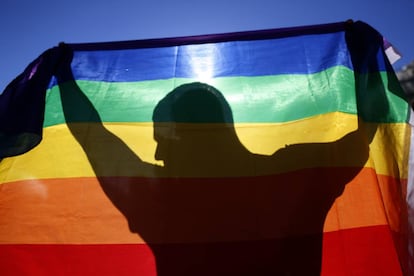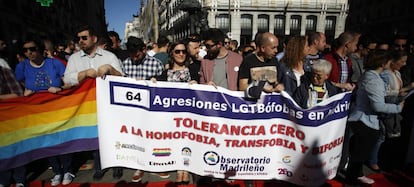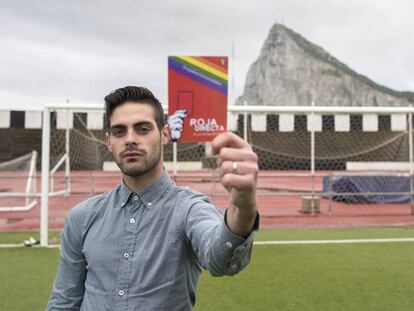Are attacks against gay people on the rise in Spain?
Reports of hate crimes are up in recent years, but increase could be due to victims being less afraid to report cases


A young man had his nose broken for calling another ¡°good-looking¡± during a night out in Madrid's trendy Malasa?a district. Two men sustained fractures to their face in the capital's Puerta del Sol after they were attacked while returning home from a party. Another man was kicked to the ground in the working class Vallecas neighborhood by a gang of youths to cries of ¡°fag, cross-dresser, AIDS carrier, cocksucker.¡±
Such incidents are being reported every other day in Madrid. So far this year, there have been 98 attacks reported against LGBT individuals in the region, according to figures provided by the Madrid Observatory against Homophobia, Transphobia and Biphobia, a hate-crimes watchdog created in February by university association Arc¨®polis.
The watchdog encourages victims of assaults and witnesses to send a message, anonymously if they wish, to report the incident. It also offers assistance to people wishing to file a police complaint.
The EU survey also found that in one of the world¡¯s most tolerant countries for homosexuals, over a third of gay people still feel they are discriminated against
Sergio, 21, was heading home with a male friend in the early hours of January 11. The pair were on a street corner in Chueca, the capital¡¯s internationally famous gay neighborhood, when a kick in the back sent him down on the sidewalk.
He says he heard someone call out ¡°You fucking faggots!¡± and felt more blows before passing out. By the time he came to, police officers were on the scene, but they did not call an ambulance. His wallet and cellphone had been stolen.
¡°I think there wasn¡¯t as much sensitivity to these issues in the past as there is now, given that so many cases are now being reported,¡± he says. ¡°They told me there were four or five attackers. They asked if we were holding hands or kissing, but we were just walking side by side.¡±
These days, Sergio, who made a formal complaint to the police, still lives with the memory of the fear he felt at the time, along with a tooth that is still loose.
¡°I think it is essential to go to the police,¡± he says firmly. ¡°I understand about the fear and the shame, but we have to try to ensure that those who beat us up are punished.¡±
Paradoxically, these sorts of incidents take place in a country internationally regarded as one of the most tolerant toward homosexuality. A recent Pew Research Center study found that Spain ranked at the top of 40 nations where respondents were asked if they found homosexuality morally acceptable. Only 6% found it unacceptable, compared with 37% in the United States.
The problems begin in school. Over half of homosexual or transgender children suffer bullying, according to the FELGTB federation, a leading gay rights group in Spain.

Last year, a 17-year-old transsexual boy named Alan committed suicide after being subjected to continued humiliation at his high school in Rub¨ª (Barcelona). Homosexuality is the leading cause of school bullying, and many victims say they have considered suicide. A FELGTB survey of 700 youths showed that 43% had thought about taking their own lives, 35% had made some preparations towards that end, and 17% had made an attempt.
But the troubles do not end after graduating from high school. In 2015, the Interior Ministry recorded 169 hate crimes motivated by the victims¡¯ sexual orientation, representing 12.7% of the total.
¡°Our perception is that attacks are on the rise, and the reason is that gay people are more visible now, because we feel we have legal protection, which seems to annoy some people. Look what happened to the exhibition on Gay Pride in Seville,¡± says Rub¨¦n L¨®pez, a member of the gay rights association Arc¨®poli, alluding to a photo show that was vandalized with homophobic graffiti.
¡°Truly, we don¡¯t know whether homophobia is on the rise or not. It seems to, because more of it is coming to light. More people are filing complaints,¡± says Alberto Mart¨ªn-P¨¦rez, the main author of several studies on hate crime and discrimination for FELGTB. ¡°The latest study, using 2015 data, showed a sharp rise in complaints, up from 17% to 44%, and that means that people are not willing to keep quiet when they are attacked, or else they seek help, and that leads them to a police precinct on the advice of the associations assisting them. It also helps that assaults are getting more media coverage, and especially news that the perpetrators are going on trial and getting convicted,¡± he says.
I understand about the fear and the shame, but we have to try to ensure that those who beat us are punished
But Ruben L¨®pez at Arc¨®polis takes a different view. ¡°The attacks that are reported to the police do not even represent 16% of the total,¡± says Rub¨¦n L¨®pez. ¡°People are afraid of being identified as gay or lesbian. Another factor is lack of trust in police officers.¡±
A 2012 pan-European study of nearly 100,000 LGTB individuals found that only one out of five victims of serious assault had reported the case to the police. Half of those who hadn't said they did not trust the police, and 29% feared a homophobic response by law enforcement officials.
Another task being carried out by the Arc¨®polis watch group is training police officers from the municipal and national forces to be more sensitive when dealing with gay people reporting attacks.
¡°We have received very positive feedback from people who filed complaints. They said they felt they were treated with a lot of respect,¡± said L¨®pez.

Iris, an 18-year-old student, did not file a complaint although she encourages others to do so.
¡°I was out partying with some friends at a club in Madrid, dancing together. This guy came up to us and tried to pick me up,¡± she recalls in a telephone conversation. ¡°I told him several times to leave me alone and that I was not interested, but he wouldn't let it go.¡±
When she decided to simply tell him she was a lesbian, ¡°he cried out ¡®Oh gross!¡¯ and kicked my side.¡± The attacker, who was apparently drunk, was spirited away by a friend.
These types of attacks in public are typically carried out by people who do not know their victims. But the FELGTB studies suggest another, darker trend.
¡°In 44% of cases, the attackers were friends, neighbors or relatives,¡± says Alberto Mart¨ªn-L¨®pez. ¡°And one out of every three attacks or discriminatory situations took place in the victim¡¯s own home or neighborhood. And in nearly half of cases, the violence is repeated, which clearly involves planning.¡±
The European survey also found that in one of the countries with a reputation for tolerance toward? homosexuals, more than a third of gay people (38%) still feel discriminated against, a figure that is still lower than the EU average of 47% and similar to the Netherlands and Belgium.
Sign up for our newsletter
EL PA?S English Edition has launched a weekly newsletter. Sign up today to receive a selection of our best stories in your inbox every Saturday morning. For full details about how to subscribe, click here.
English version by Susana Urra.
Tu suscripci¨®n se est¨¢ usando en otro dispositivo
?Quieres a?adir otro usuario a tu suscripci¨®n?
Si contin¨²as leyendo en este dispositivo, no se podr¨¢ leer en el otro.
FlechaTu suscripci¨®n se est¨¢ usando en otro dispositivo y solo puedes acceder a EL PA?S desde un dispositivo a la vez.
Si quieres compartir tu cuenta, cambia tu suscripci¨®n a la modalidad Premium, as¨ª podr¨¢s a?adir otro usuario. Cada uno acceder¨¢ con su propia cuenta de email, lo que os permitir¨¢ personalizar vuestra experiencia en EL PA?S.
En el caso de no saber qui¨¦n est¨¢ usando tu cuenta, te recomendamos cambiar tu contrase?a aqu¨ª.
Si decides continuar compartiendo tu cuenta, este mensaje se mostrar¨¢ en tu dispositivo y en el de la otra persona que est¨¢ usando tu cuenta de forma indefinida, afectando a tu experiencia de lectura. Puedes consultar aqu¨ª los t¨¦rminos y condiciones de la suscripci¨®n digital.










































